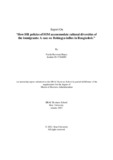| dc.contributor.advisor | Majumdar. Dr. M. Nazmul Amin | |
| dc.contributor.author | Haque, Nazifa Rezwana | |
| dc.date.accessioned | 2021-08-01T05:11:38Z | |
| dc.date.available | 2021-08-01T05:11:38Z | |
| dc.date.copyright | 2021 | |
| dc.date.issued | 2021-01 | |
| dc.identifier.other | ID: 17264085 | |
| dc.identifier.uri | http://hdl.handle.net/10361/14880 | |
| dc.description | This internship report is submitted in partial fulfillment of the requirements for the degree of Masters of Business Administration, 2021. | en_US |
| dc.description | Cataloged from PDF version of internship report. | |
| dc.description | Includes bibliographical references (pages 19-20). | |
| dc.description.abstract | International organization for Migration (IOM) is an organization under the United Nations
whose main task is to monitor and handle the migration sector of the UN, it is also known as
the UN migration agency. Over the years, IOM has grown into 173 Member States and a further
8 states holding observer status. Its global presence has expanded to over 400 field locations.
With over 90 percent of its staff positioned in the field, IOM has become a lead responder to
the world’s worst humanitarian emergencies. In Bangladesh, IOM is currently working with
the Rohingya project, though IOM has been operating in Bangladesh for a long time after the
Rohingya influx, they have implemented various changes in their HR policies. This report
reflects the changes that IOM Bangladesh has gone through before and after the Rohingya
influx and how they have managed their HR policies during this recent Covid-19 situation | en_US |
| dc.description.statementofresponsibility | Nazifa Rezwana Haque | |
| dc.format.extent | 22 Pages | |
| dc.language.iso | en_US | en_US |
| dc.publisher | Brac University | en_US |
| dc.rights | Brac University Internship reports are protected by copyright. They may be viewed from this source for any purpose, but reproduction or distribution in any format is prohibited without written permission. | |
| dc.subject | IOM - International organization for Migration | en_US |
| dc.subject | Influx | en_US |
| dc.subject | Rohingya | en_US |
| dc.subject | Human Resource policy | en_US |
| dc.title | How HR policies of IOM accommodate cultural diversities of the immigrants: A case on Rohingya influx in Bangladesh | en_US |
| dc.type | Internship report | en_US |
| dc.contributor.department | Brac Business School, Brac University | |
| dc.description.degree | M. Business Administration | |

